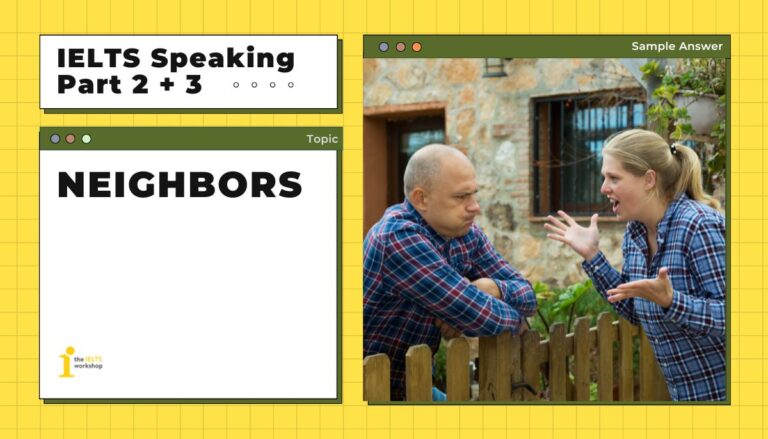Dưới đây là bài mẫu cho chủ đề Neighbour trong IELTS Speaking Part 2 & 3 do thầy Nam Phạm của The IELTS Workshop gợi ý. Cùng tham khảo một vài cách diễn đạt ghi điểm trong phần thi IELTS Speaking nhé.
Part 2: Describe an interesting neighbour
Describe an interesting neighbour
You should say:
Who he/she is
How you knew him/her
What you do together
And explain why he/she is interesting
Dưới đây là bài mẫu cho topic “Describe an interesting neighbour“.
1. Bài mẫu (Sample Answer)

2. Từ vựng (Vocabulary Highlight)
- nourishing: bổ dưỡng
- accommodating: sẵn lòng giúp đỡ
- tranquil: thanh bình
- admiration: sự khâm phục, ngưỡng mộ
- stem from: bắt nguồn từ
- hardship: sự gian khổ, khó khăn
- subsidy period: thời bao cấp
- dilemma: thế khó xử, tiến thoái lưỡng nan
- count on sb: dựa vào ai đó
- scolding: sự rầy la, trách mắng
- bestow: ban, tặng cho
- in abundance: nhiều, dồi dào
- strive to be: cố gắng, phấn đấu thành
- get-together: cuộc gặp mặt xã giao
Part 3: Neighbours
Bên cạnh Part 2, bạn hãy tham khảo thêm Part 3 cho chủ đề này nhé
1. Do you think people are familiar with their neighbours?
2. How can people improve the relationship with neighbours in a community?
3. How do children build relationships with others in a community?
4. Is it beneficial to get along well with neighbours?

1. Do you think people are familiar with their neighbors?
This might be true in the past as, before the current rapid urbanization, people used to live closer and provide support to whoever was in need. To my knowledge, back then neighbors in a small town could memorize each other’s names by heart. Through time, the indifference grows larger due to the hectic working life, petty strife, and huge gaps between social statuses, which consequently lead to a society of growing living conditions but at the expense of valuable relationships.
- indifference: sự lãnh đạm, thờ ơ
- petty strife: cuộc tranh chấp nhỏ nhặt
- social status: địa vị xã hội
- at the expense of: với cái giá phải trả là
2. How can people improve the relationship with neighbors in a community?
Even though neighboring connections have been neglected in recent years, there are still examples of healthy neighborhoods that we could learn from. One way that I find most prevalent is to hold monthly local gatherings to maintain a solid bond between families, create an environment for people with mutual interests, or just have small talks about social affairs over dinners and friendly cookouts. Another effective method would be to respect other people’s privacy as the number one reason for conflicts within communities is that some individuals would pry into one’s personal life and make faulty rumors.
- prevalent: phổ biến, thịnh hành
- solid bond: mối quan hệ vững chắc
- social affairs: vấn đề xã hội
- pry into: nhúng mũi vào
3. How do children build relationships with others in a community?
The young are those of innocent mindsets that could get along with one another well, evidently how we used to play with our childhood friends without a care in the world. Of course, there are still possible outcomes for toddlers acting selfishly, fighting over trivial things and getting alienated from the community as children tend to have a possessive nature to them. Avoiding this means parents must be involved in the way their offspring interact with others. To sustain healthy relationships, youngsters must learn how to constrain the urge to behave intrinsically to their liking as well as to respect and play fair with others.
- alienated: bị xa lánh
- possessive nature: bản tính chiếm hữu
- constrain: hạn chế, giới hạn
- intrinsically: về bản chất
4. Is it beneficial to get along well with neighbors?
Except for neighbors who always act superficially or deviously try to get the most out of everyone, being friendly with nearby people would most of the time bring about positive results. Respecting others also means respecting yourself, and if you help others, chances are they will repay you with fruition. There are even kind souls that would even befriend you first, regardless of your financial or social background, ready to aid you through crises in life and ask for nothing in return. To accommodate such attentive residents, we should always try to honor the presence of others with adoration and be friendly with whomever we cross paths with.
- act superficially: hành xử một cách nông cạn
- deviously: không thẳng thắn
- get the most out of sb/sth: giành phần nhiều nhất từ ai đó
- fruition: thành quả
- social background: nền tảng xã hội
- adoration: sự yêu mến
- cross paths with: bước ngang qua
Bài mẫu bởi thầy Nam Phạm – Giáo viên The IELTS Workshop HN
Trên đây là bài mẫu cho chủ đề Neighbor trong IELTS Speaking Part 2 và Part 3.
Nếu bạn đang gặp khó khăn trong xây dựng câu trả lời cho phần thi IELTS Speaking Part 3, hãy tham khảo ngay phương pháp học tại khóa Senior của The IELTS Workshop.









